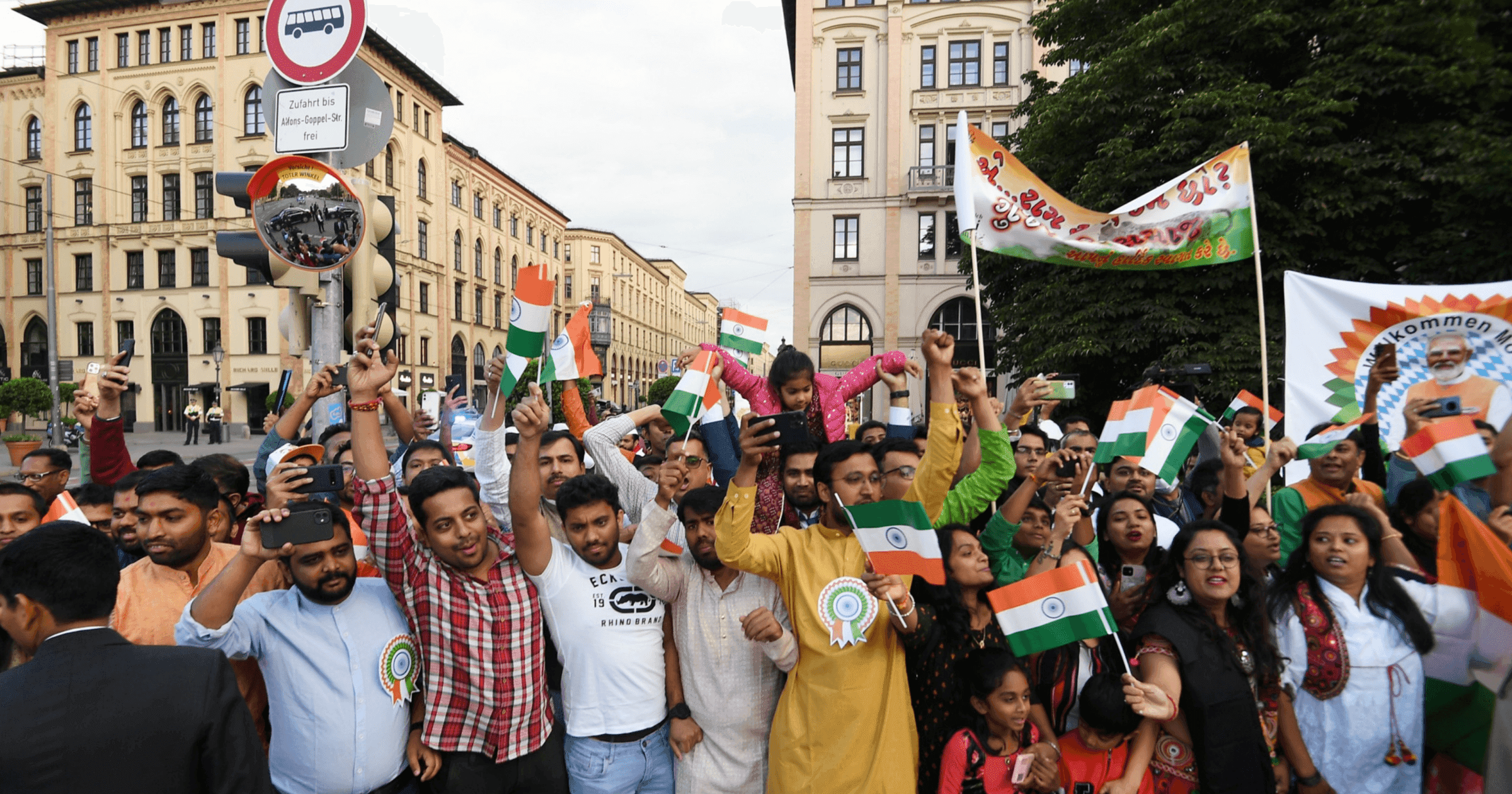The driver of the European economy, Germany has been a magnet for foreigners. Thanks to its favourable immigration policies, the population of Indians in Germany has been steadily growing in the past 20 years. They come to study and stay to work, and some of them later decide to make it their second home. Overall, Indians in Germany proved to be earning more than other foreign nationalities and thus not only have a high standard of living but are also able to support their families back in India. In this article, we outline the main aspects of life in Germany for Indians and give some practical recommendations on how to navigate it with the best outcome.
Diaspora
Today, Germany is home to the 3rd largest Indian community in Europe after the UK and Italy. Migration of Indians to Germany accelerated after WWII, peaked in the 1970s, and then stagnated in the 1990s, partly due to strict immigration laws. Later on, however, the German government recognised the importance of skilled migrants, including from India, for the economy. After a series of immigration and labour reforms, Germany created the least restrictive admissions system for certain categories of workers. As a result, in the 2010s, the number of Indians in Germany doubled. So, how many Indians live in Germany today? Over 200,000 Indian nationals hold a regular residence permit, and another 43,000 are enrolled in German universities. When deciding where to live, note that most of the population of Indians in Germany can be found in the Western regions such as North Rhine Westphalia, Bavaria, and Baden Wurttemberg.
How many Indians live in German cities
| City | People |
|---|---|
| Berlin | 13,450 |
| Frankfurt | 7,412 |
| Hamburg | 6,100 |
| Munich | 11,228 |
| Stuttgart | 3,624 |
Visas
There are several types of visas available depending on the specific circumstances. For example, for those looking for jobs in Germany for Indians, there is an option of getting a jobseeker visa. This option allows them to enter Germany and stay there for up to 6 months while hunting for employment. Highly skilled workers can apply for an EU Blue Card. Most of the German Blue Card permits are issued to Indian nationals, so Germany for Indians is a paradise in this regard (you can read more about the programme here). There is also a separate visa type for IT specialists. Just remember that getting a visa is a complex process which may take up to 3-4 months.
International students and jobseekers are also required to open a so-called blocked bank account (Sperrkonto) to prove they have the financial means to support themselves. Currently, the monthly allowance is set at €934, which means that the applicant must deposit €11,208, of which the former amount is released each month during the year. In the case of a scholarship, the amount can be deducted from the funding.
In addition, after entering the country on a visa, you must register with competent authorities and, in case of employment, get your work permit, which is a separate document for Indians in Germany.

Renting a place
With the demand for rental properties at all times high, renting a suitable place in Germany can be a real challenge. If you were lucky to find something to your liking, be prepared for the prospective landlord to be picky and check references with your employer before signing the contract.
As with anywhere else, the prices vary greatly between locations, but some cities tend to be more expensive, as you can see from the table below.
Average rent for a 1-bedroom flat, €/month
| City | Centre/Suburbs |
|---|---|
| Berlin | 1,370/1,000 |
| Cologne | 900/680 |
| Frankfurt | 1,140/870 |
| Hamburg | 1,050/800 |
| Munich | 1,370/1,020 |
| Stuttgart | 1,280/790 |
Besides the actual rent, you will also have to pay a deposit, which is usually about 1-3 monthly rents. It is used as an insurance against any potential damage to the property; therefore, if you keep the place in good condition, you will probably get it back in full when the contract expires.
Other expenses include utilities, such as water and electricity, which are rarely covered by the rent. The tenant also has to take care of the internet connection (around €30-40 per month) and pay a so-called public broadcasting service fee (currently, €18.36 per month per household). Keep in mind that flats lent long-term usually come without any furniture. In some cases, however, buying out the furniture from the previous tenant may be possible. Considering how many Indians in Germany rent accommodation, the tenant might as well be your compatriot and give you a good price! Also, any installation work requires special permissions and must be performed by a professional (say, if you want to set up a dishwasher).
When you finally settle all formalities, move in, and decide to throw a housewarming party, make sure it’s not on a Sunday and remember to wrap it up early: Germans can be very sensitive to any kind of noise or disturbance then, which you learn after they have reported you to your landlord.
Work
The most popular jobs in Germany for Indians include those in engineering, IT, finance, and healthcare.
Is Germany good for Indians as a place to work? Judging from how many Indians in Germany are working towards building their careers, the answer is yes. However, when starting employment, Indians should be aware that the German corporate culture tends to be more formalised and structured. Being punctual is expected by default. The good news is that timelines are often flexible; for instance, you can work either 8 to 5 or 9 to 6, whichever suits you best. Most businesses work a 5-day / 40-hour week, and the maximum is 48 hours per week (up to 60 in some cases). Any employee is also entitled to regular breaks during a working day and to at least 18 days off in a year.
Since 2015, Germany has had a statutory minimum wage, which is applicable to all categories of workers, including international students and foreigners such as Indians in Germany. It is set to increase to €12.41 per hour in 2024 and to €12.82 in 2025 from €12 in 2023. (For some occupations, the minimum wage is higher, such as €18.25 per hour for qualified carers.) This means that working full-time for 40 hours per week you will be earning at least around €25,000 per year, but highly skilled jobs in Germany for Indians offer much higher income (which may allow to send more money home).
Average salaries are also substantially higher than the minimum but vary from city to city:
- Berlin €51,000
- Frankfurt €66,500
- Hamburg €52,500
- Munich €65,200
- Stuttgart €66,200
The estimated cost of living for an individual in Germany is between €1,200 and €3,000 per month, so even on an average salary, life in Germany for Indians can be pretty affordable and allow them to save enough cash to send back home to their loved ones, which is super-easy and cheap with Profee!

Taxes and social insurance contributions
Salaries in Germany might be higher than in many other countries, but you also must share your earnings with the state, and Indians in Germany should take this seriously. The income tax can reach up to 45%, but the first €10,908 are exempt. Unlike other countries, Germany gives no tax preferences to digital nomads (learn more about how to become one here).
Similarly, around 20% of your gross salary goes to various social insurance contributions, including health, pension, unemployment, and others. However, if you are a freelancer or self-employed, you only need to pay for your health insurance.
For those Indians on a salary in Germany, it is important to know that it has a special agreement with India which allows you to effectively manage social security contributions between the two countries instead of just losing the money paid out to the German state after your employment contract expires. This makes jobs in Germany for Indians even more attractive.
Education
The student population of Indians in Germany is the 2nd largest group of international students after Chinese. As there are now many schools in India that teach German as a primary foreign language, young people take advantage of the affordability and quality of German education, and the number of Indians in German universities increased more than 12-fold between 2009 and 2022.
There are two other major benefits of being a student in Germany. First, international students are allowed to work, with some limitations. This means that even while studying, you can be an Indian with a salary in Germany and be able to support your family back in India. Second, after graduation, the student can stay in Germany for up to 18 months and try to secure employment.
Public universities in Germany offer German-language programmes of study almost for free; students may be required to pay only a small administrative fee, which is a very appealing offering in Germany for Indians. It is also possible to enrol in an English-language course with a private university, but in this case, the fees can be as high as €30,000 per academic year.
The situation is similar for childcare and schools, which is an important matter for the substantial number of Indians in Germany who have children. Public establishments are free (or almost free), though it can be difficult to secure a place there for your child due to a general lack of such facilities in the country. Alternatively, there are private institutions, but you need to be ready to dig deep into your pockets. For example, private childcare may cost up to €1,000 per month, whereas international schools charge between €15,000 and €20,000 per academic year.
Communication
As for any expat anywhere, life in Germany for Indians means making new friends. Luckily, Germans are outgoing and friendly people, and the expat community is huge. Even in the work environment, it won’t take much effort to get along because there is a great tradition of Feierabendbier or celebrating the end of the working day with a beer at a bar. So, next time anybody asks you, “Is Germany good for Indians?” you know what to say. Of course, to feel at ease when making friends – and more confident in general as an Indian in Germany – it is highly recommended that you keep polishing your German language skills as well.
And if you miss speaking your own language, search online for events for Indians in Germany, such as by the Indo-German Society (DIG), or by an expat group, which are abundant throughout Germany. And, of course, don’t forget to call your loved ones back home and send them online money gifts here and there – and if you do it with Profee, you will save much time, effort, and, more importantly, money!



